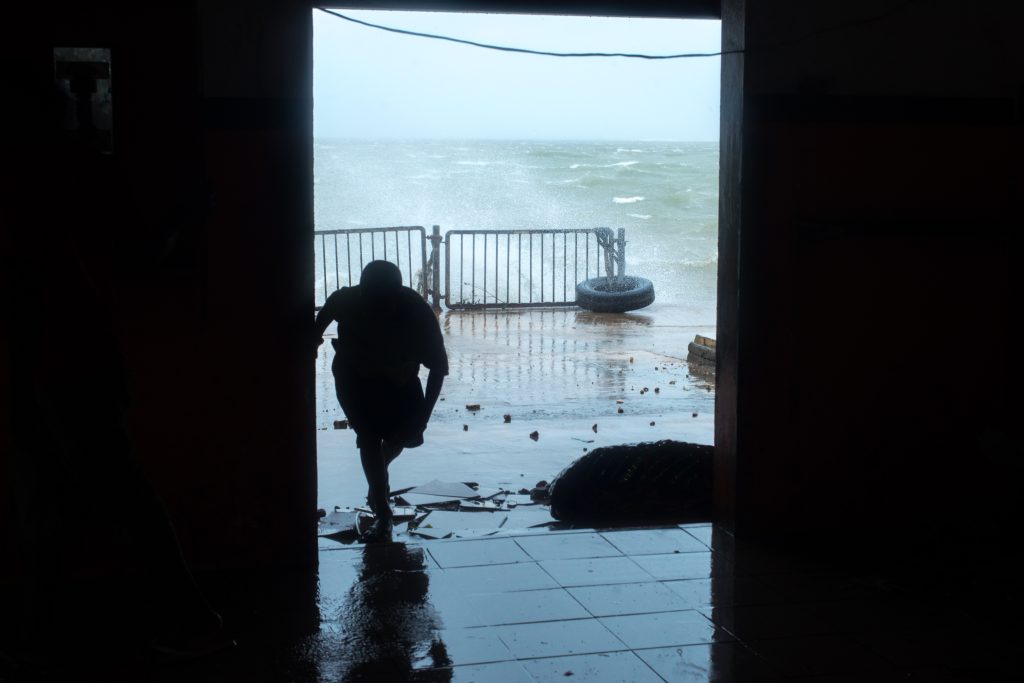
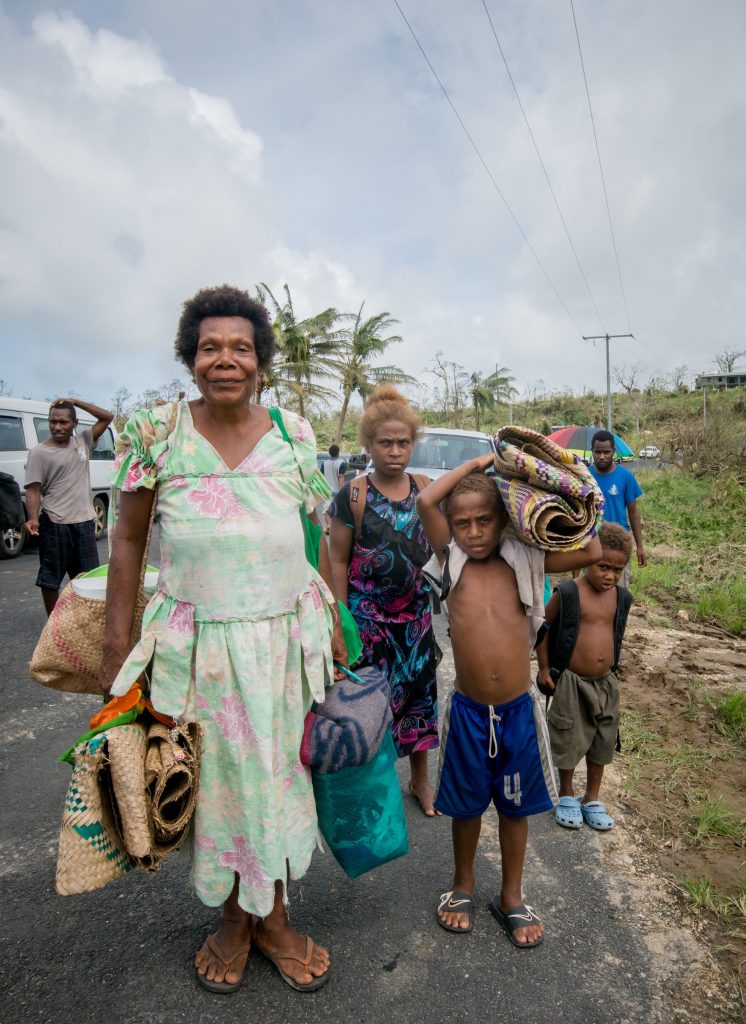
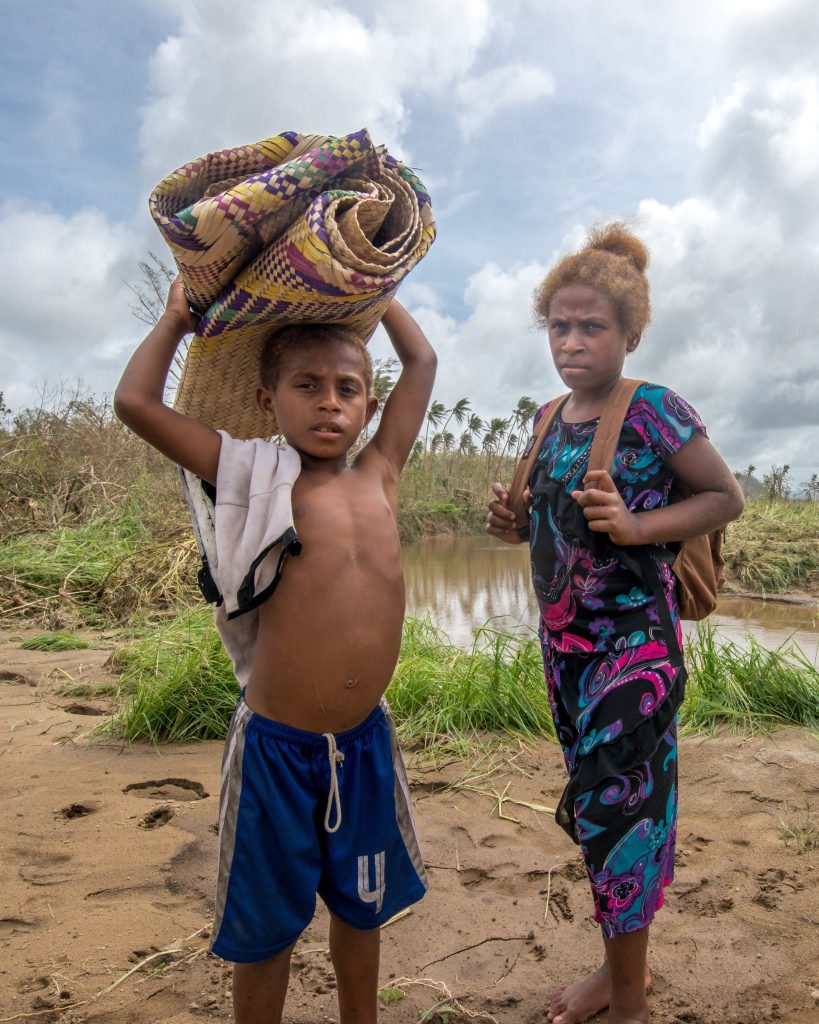
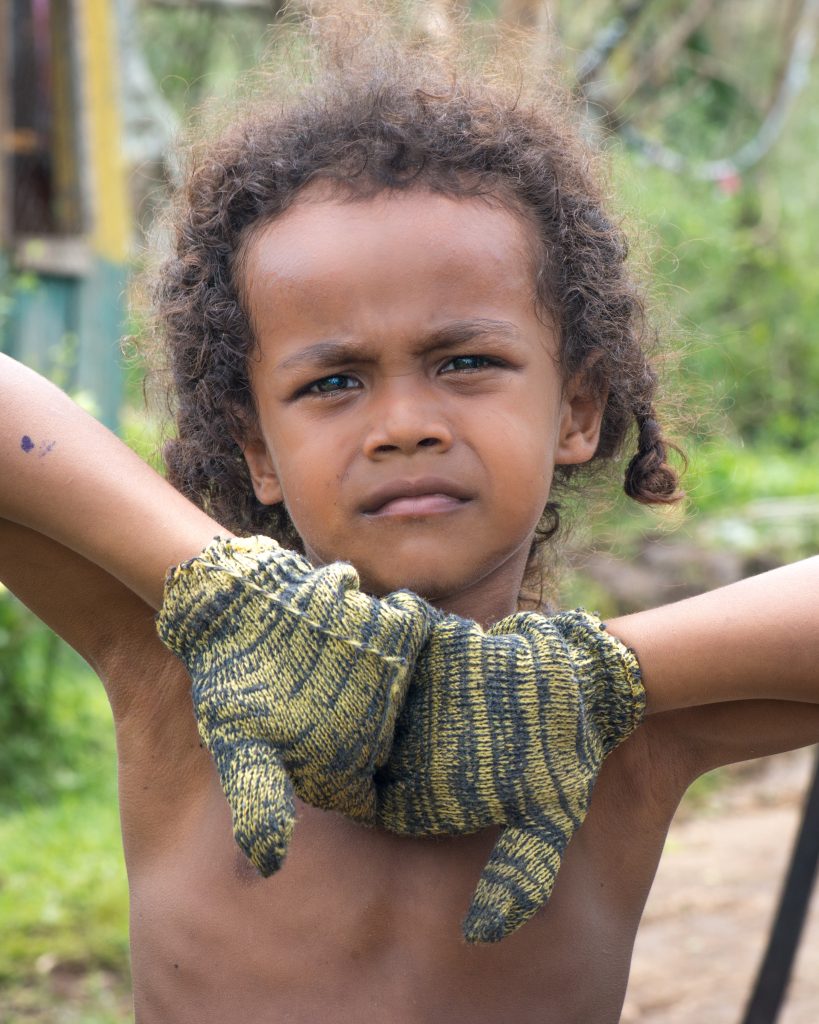
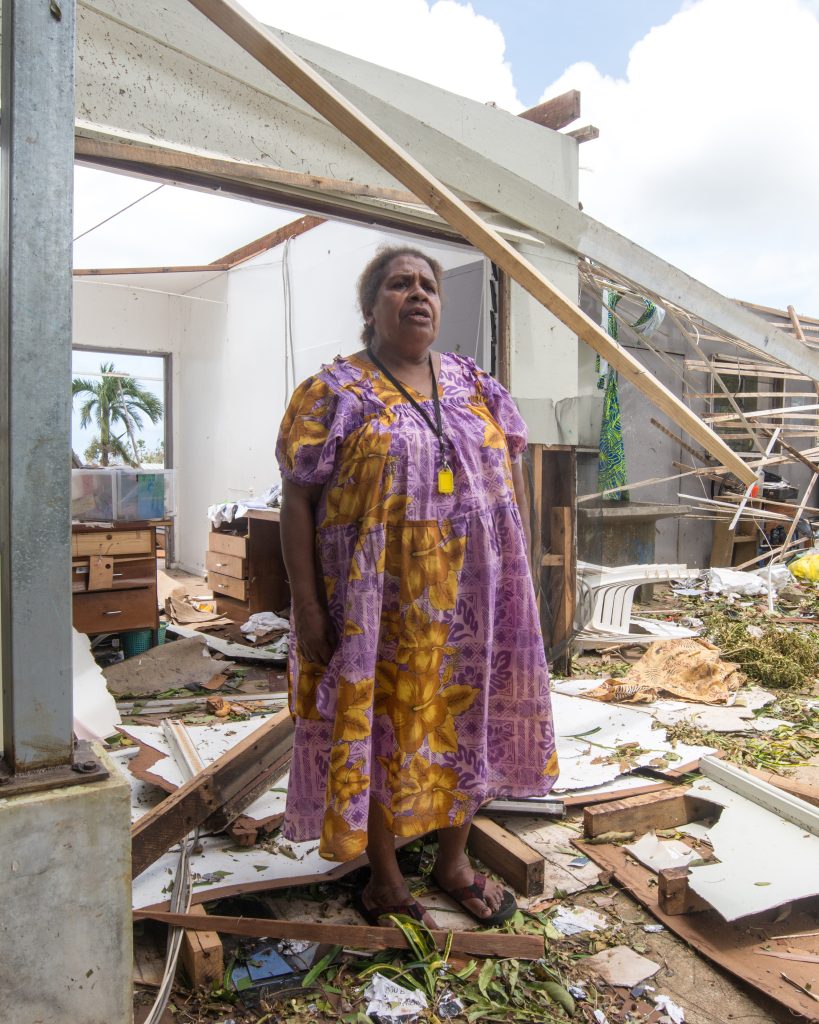
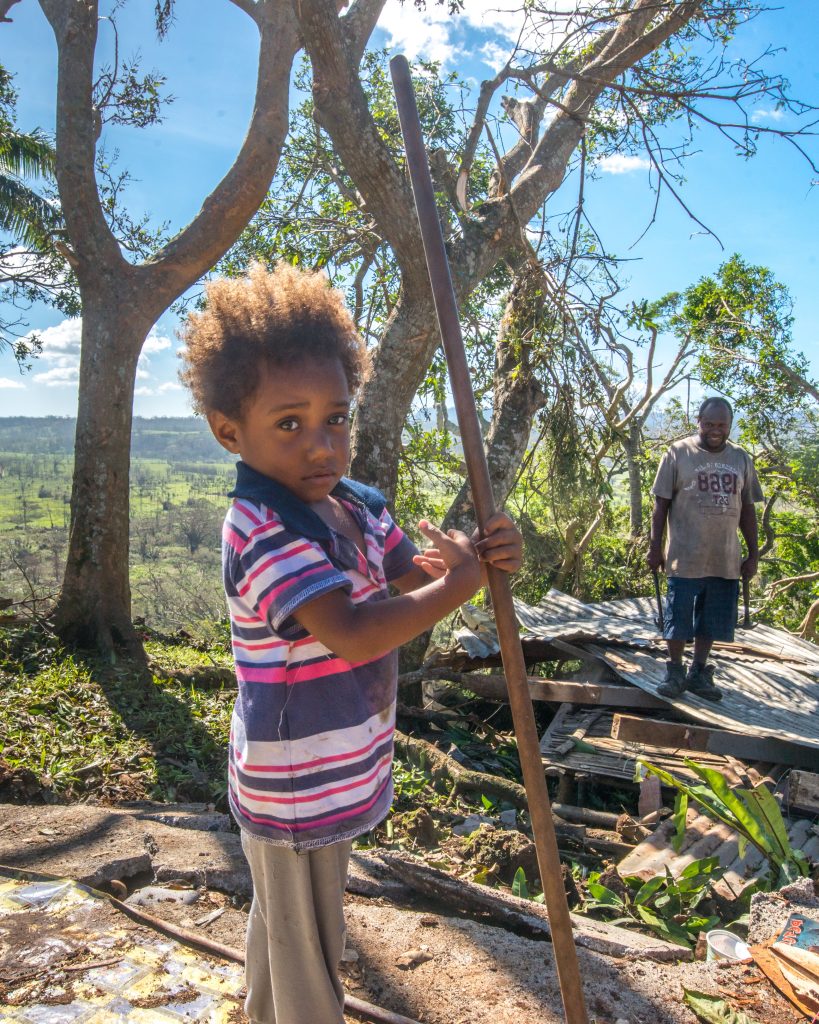
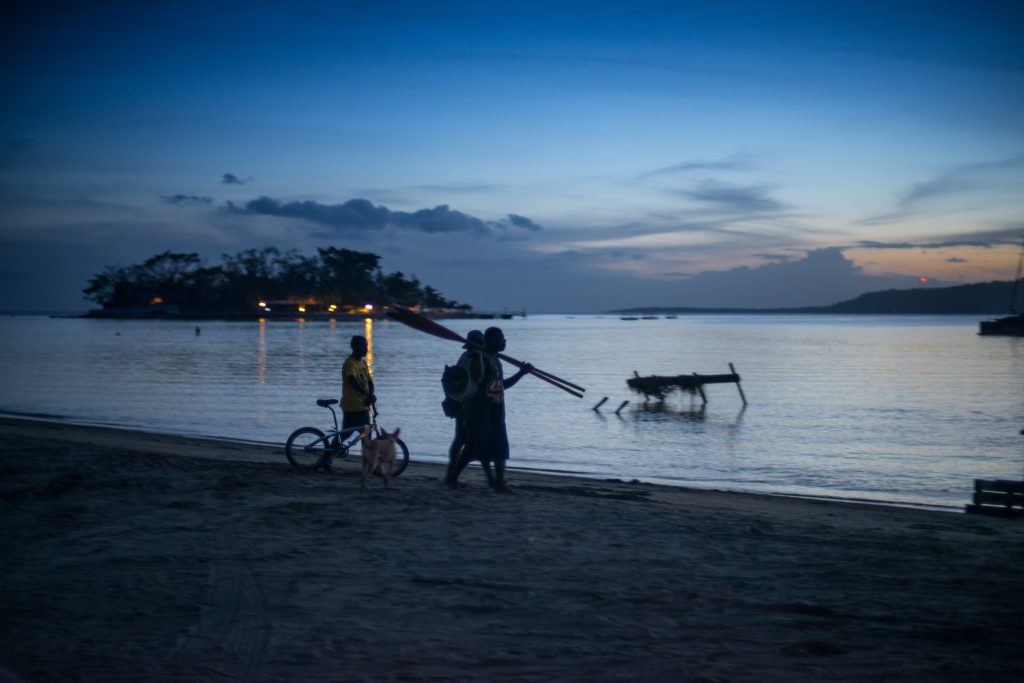







There are two ways to make a movie like ‘Tanna’:
You could spend millions housing and caring for a cast and crew of hundreds, millions more on costumes, sets, make-up and outlandish logistical costs, and even more on lavish, painstakingly built CGI effects.
Or you could take a couple of hand-held cameras and go live in Yakel village for six months.
Both approaches would probably work, more or less. The first will get you The Mission, or Mosquito Coast, or—heaven help you—Fitzcarraldo. But only the latter is capable of capturing the heart of kastom in Tanna.
‘Tanna’ is visually lush and—happily—not polished. The actors have bad hair days, they have calloused hands and dirt under their nails. And this matters, because ‘Tanna’ is not just another hackneyed love story transposed into an exotic locale. It is composed of the essence of life in traditional Vanuatu. Read more “Barefoot on the red carpet”
Wan Smolbag’s new play, Kaekae Rat, is a broadly acted but subtly layered allegory of life in modern Melanesia
Originally published in the Vanuatu Daily Post
‘Really,’ asks the King Rat, ‘how exactly are rats and humans different?’
Out of that simple spark rises a complex allegory of honesty and deceit, selfishness and survival, all found in the least likely places. Wan Smolbag’s newest play—one of three in this year’s season—is the most ambitious yet in terms of its story-telling. Director Peter Walker says the play has a bit of a Cinderella quality to it, but here, it’s the rats are riding in coaches.
Rats and humans have always lived together, we are asked, so how, exactly how do they differ? They have leaders and followers; they all live and thrive surrounded by refuse; they squabble and vie incessantly; and they lust and love—and confuse the two—just as (in)constantly.
So why is it such a big deal then, when the King Rat becomes obsessed with Veronik, a still-pure flower of a girl, living in semi-squalor in Port Vila? At turns charming and menacing, he and his cohort are willing to wheedle, extort, con and coerce anyone in order to win her hand. Despite King Rat’s constant moans of frustrated desire, the solution turns out to be a simple one: Just find enough money to satisfy the girl’s so-called parents, and nothing else matters. Not even the wishes of Vero herself.
The plot writhes from one episode to another as rat and human natures try to come to terms, and as their mutual motivations are unveiled, it becomes increasingly difficult to answer King Rat’s question. And yet… and yet, as Vero’s younger brother candidly confesses, ‘who wants a rat for a brother-in-law?’ Read more “An urban kastom story”
but it was only my first robin
Every day I face the suspicion
that you have had secret springtimes
sunlights that you hid from me
clandestine pussy willows camouflaged
whole choirs of spring peepers
cued by no baton but yours
hidden nations of tulips
daffodils and crocuses
held in boxcars
and run through town at night
without stopping no lights
no whistles
I don’t know which of us to worry for
I’m waiting for the song that writes itself,
A choir of one with hymn sheet white and clear,
Whose even blankness is a kind of wealth.
A coruscating symphony of stealth,
At once a glance to Heaven and a leer—
I’m waiting for the song that writes itself.
A city full of strangers, smug in health,
Devoid of life and liberty and fear,
Whose even blankness is a kind of wealth,
Averse to dying as to life itself:
They will persist, though cities disappear.
I’m waiting for the song that writes itself.
The teacup cracking on the kitchen shelf,
Discarded with a backward-looking tear
(Whose even blankness is a kind of wealth),
The brahmin contemplating loss of self…
Both gravitate toward something too austere.
I’m waiting for the song that writes itself.
I cannot hum it, even to myself,
Nor puzzle out its immanence, this fear
Whose even blankness is a kind of wealth.
Existence has a price that’s far too dear,
But nothingness? A trifle too severe.
I’m waiting for the song that writes itself,
Whose even blankness is a kind of wealth.
And Love says
to Death, “That’s the last time
I let you borrow my clothes.
Just look at these wrinkles–
and that stain! My God.
What did you DO?”
(Whacks her over the head
with a hairbrush, and they’re
scrapping all over the room.
Love comes up short one
tooth.)
She screams, but Death,
her eyes are burning like dull coals:
“You just don’t know, do you?
You never never try to understand.
Well it was an accident
but right now I’ve a mind
to accident you.”
(Love is hysterical.)
“You wouldn’t,” she screams.
“You never could!”
(Runs out in tears. Never comes back.)
The birds arrive at six, begin to feed.
Petulant and raucous, their harangue
stifles the belief they ever sang.
Squirrels make off with all the fallen seed.
The chickadees are orderly in greed;
The jays are not: on suet left to hang
they find a perfect stage for sturm und drang.
Only poets could decry this simple creed.
This is no scene of joy, but satisfaction
flies on stronger wings than love or beauty.
Think good thoughts, but in the end it’s action
(applied with elbows) that defines our duty.
Feed the masses, let the poets rue it.
Their verses nourish less than lumps of suet.
My heart announced today that it will leave.
It kicks in expectation like a child
in the womb, a trapped miner at piled
timbers: long past the urge to grieve,
he gathers up the threads of air that weave
life in darkness, then is reconciled
and only waits. I am no more beguiled
by death than he. Still, my heart will leave.
The unborn child cannot begin to fear
the pain his mother feels, the open wound
that he creates, and when she draws him near
no memory will scar him. All too soon,
I will live this parturition. Pleasure
has no gift to match this last long measure.
For years, the devil stood behind my shoulder,
More menacing than metaphor or fact,
And mocking, scrutinised my every act.
Strengthened by my sin, but never bolder,
He preyed on each miscue; and so bewildered,
I never knew so much as what I lacked.
The prism of his gaze was bright and cracked,
And through it, every failure fused and filtered.
No saint had ever such a close companion,
Nor misery as sweet, nor pain as dear,
Infallible, unflinching and sincere.
So hope, faith and belief were all abandoned.
In terror, in my guilt, I never crossed him,
But aged and bored, I find now that I’ve lost him.
[This review of Wan Smolbag Theatre’s new play, Zero Balans was written for the Vanuatu Daily Post.]
Zero Balans, the new play from Wan Smolbag Theatre, seems to argue that you can be powerful and you can be good, but you can’t be both at once.
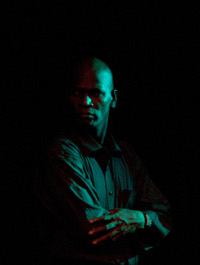 This political morality tale recounts the story of Ezekiel. A charismatic, intelligent and powerful man, his weakness and self-indulgence have led him to achieve only notoriety in his years as a cabinet minister. Struck down by an early heart attack and faced with eternal damnation, he demands, cajoles and finally begs the Recording Angels for just a little more time to achieve all the good he intended.
This political morality tale recounts the story of Ezekiel. A charismatic, intelligent and powerful man, his weakness and self-indulgence have led him to achieve only notoriety in his years as a cabinet minister. Struck down by an early heart attack and faced with eternal damnation, he demands, cajoles and finally begs the Recording Angels for just a little more time to achieve all the good he intended.
We follow him through flashbacks from his early days in politics. His wildly optimistic promises inflame and inspire the fictional community of Lagoon Saed. The delirium of his first election victory quickly wanes, however; before the celebration is properly over, he is already beset with demands from above and below.
Derek, Ezekiel’s mentor and financier, quickly reminds him where his sympathies had better lie, but not before Ezekiel’s wife and sister have begun to plague him with demands for the family. The community chief, an amiable old rascal, is quickest of all, proclaiming the newly-minted MP’s value to the community even as the voting results are being read.
This is Vanuatu. Everybody needs something, and it’s never something small. In a cutely staged scene, community members literally climb over one another to bend Ezekiel’s ear – and open his wallet. His political masters are happy to keep him flush with cash, but only as long as he toes the party line.
Politicians in Ezekiel’s world seem to have a nodding acquaintance with policy and development, but the ever-present threat of a confidence motion leaves them perpetually scrambling after cash and other emoluments to keep their MPs onside. Happily for them, they do not lack in assistance from outside ‘investors’ willing to grease the wheels of the political machine.
Ezekiel is willing to say anything to avoid damnation. But as events progress, we come to see him as merely human, a man fallen victim to the same desires and temptations as any other man – albeit sometimes two at a time. Beset as he is in a morass of venality, short-sightedness and fickleness, he is, ultimately, no better than he should be.
It’s notable that the play’s purportedly moral and upright citizens come out with very little shine remaining on their respective halos. Playwright Jo Dorras, as she always does, avoids the easy accusations. Refusing the lie that politicians are just amoral rascals sprung sui generis from the ranks of humanity, she shows how the scramble for advancement and advantage afflicts everyone, inside politics and out.
But this is not a society of villains. If Ezekiel’s sister wants more money, it’s to send her children to a better school. The chief comes seeking hundreds of thousands, not for himself but for the local church. Ezekiel protests to the Recording Angels that it was these demands (and not the endless spending on baubles, booze and debauchery) that have driven him into the company of men who are altogether too comfortable in the faithless, venal world of Vanuatu politics.
Given a chance at redemption, however, Ezekiel quickly finds himself bereft of friends and influence. In becoming a good man at last, he is stripped of the influence he once had.
As with all Smolbag productions, Zero Balans avoids polemic and prescription. The play seeks primarily to subvert the common conception that simply changing one’s MP is enough to change the cycle of corruption and callous disregard for the future. It is a mordant indictment of Vanuatu society’s inability to look beyond its immediate needs and desires, to forego quick reward in order to strive for a greater good.
Nobody, it appears, is willing to forebear in order for all to thrive.
The only characters who demonstrate any degree of redemption are those who, like Ezekiel, are at last left with nothing but the clarity of their own vision. The performance of the night was provided by Helen Kailo, who played Lisa on the evening we went. (She shares the role with Florence Taga, another powerful young actor.) Kailo’s fluid, natural and finally heart-breaking rendition of a young woman seduced, discarded and ultimately cast out of her own community was one of the best yet seen onstage in Vanuatu.
But the wisdom of misplaced love and bitter experience isn’t enough to obviate the oppression of society and circumstance. In this world, some forces are too great for any of us.
Director Peter Walker says, “[W]e collude with politicians and it takes a brave person to rock the boat. However the danger is that even if someone does rock the boat it may be too late because some people are beyond the law.”
Zero Balans features some of the most polished and professional performances to grace Wan Smolbag’s stage so far – and certainly its best ensemble effort. It’s testament to the commitment of the husband and wife team of Peter Walker and Jo Dorras that many of Smolbag’s actors have been appearing consistently on stage and screen for years now – some for decades. Their maturity, experience and enduring passion add fluidity and considerable nuance to a complex, demanding script.
Morinda Tari, as the protagonist’s importunate sister Elise, was so consistently powerful and natural that we’re not sure people even realised they were watching a character. She has the power to carry an entire play. We hope to see her in a leading role some day soon.
Noel Aru (who alternates with veteran Titus Joseph as Ezekiel) created a mannered, professional portrayal of a complex, deeply flawed man who quite literally fights for his life from the beginning of the play. He showed the maturity of a seasoned actor, sustaining his presence yet allowing space for others such as Donald Frank, whose smooth, serpent-like self-awareness made Derek, a mephistophelian political leader, at once alluring and repugnant.
Special mention goes to Danny Marcel, who plays two key roles (as the PM and the community’s chief) with such adroitness and flair that we honestly didn’t realise we were watching the same man. His sense of timing and physicality is superb. Aru, Frank and Marcel’s first scene together is a comic gem that competes with the best British political satire.
Zero Balans is performed at 7:00 p.m. every Wednesday, Friday and Saturday evening at Wan Smolbag until June 25th. Tickets are 50 vatu each. Arrive at least an hour early to be guaranteed a seat.